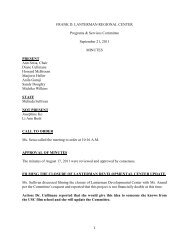Conservatorship - Frank D. Lanterman Regional Center
Conservatorship - Frank D. Lanterman Regional Center
Conservatorship - Frank D. Lanterman Regional Center
You also want an ePaper? Increase the reach of your titles
YUMPU automatically turns print PDFs into web optimized ePapers that Google loves.
How <strong>Conservatorship</strong> Works<strong>Conservatorship</strong> is a legal proceeding through which an individual or agency (theconservator) is appointed by the court to protect and manage the personal care orfinances, or both, of someone 18 years of age or older (the conservatee) who hasbeen found by the court to be unable to do so for himself or herself. A conservatorwho is given authority to manage the personal care of another is called “conservatorof the person.” A conservator who is responsible for another person’s finances iscalled “conservator of the estate.” You can be appointed either conservator of theperson or conservator of the estate, or both, depending on the needs of your child.Before the court will agree to appoint a conservator of the person, it must be shownthat the proposed conservatee is not able to adequately make decisions concerning hisor her own personal needs, including medical care, residence or education. Similarly,a conservator of the estate may be appointed if a person has been shown to be unableto manage his or her own financial resources, or unable to resist fraud or “undueinfluence” by another. Along with the authority to make decisions for the conservatee,the conservator has a responsibility to make choices that support the conservatee’swishes and encourage maximum potential.Types of <strong>Conservatorship</strong>s Recognized in CaliforniaTwo types of conservatorships are recognized in the state of California. Mentalhealth conservatorships, generally referred to as an L-P-S conservatorship, andprobate conservatorships which are referred to by this term because they are definedin laws found in the California Probate Code and may either be general or limited.Mental Health <strong>Conservatorship</strong>A 1969 California law, called the <strong>Lanterman</strong>-Petris-Short Act, created a legalconservatorship (generally referred to as an L-P-S conservatorship) intended to protectpeople, including adults with developmental disabilities, whose serious mental illnesslimits their ability to provide for their own needs for physical care, food, clothing orshelter. It allows the conservator to make decisions for the person in a number of areasof life, and to arrange for certain kinds of restrictive living arrangements and mentalhealth treatment if the person is unable or unwilling to accept these things voluntarily.Probate <strong>Conservatorship</strong>General <strong>Conservatorship</strong>The general conservatorship was established for adults who are unable to care forthemselves or manage their own finances. People subject to general conservatorshipsare often elderly, with limitations associated with the aging process. This typeof conservatorship may also be applied to people who are seriously impaired foranother reason, such as from an accident or illness.2<strong>Conservatorship</strong>















